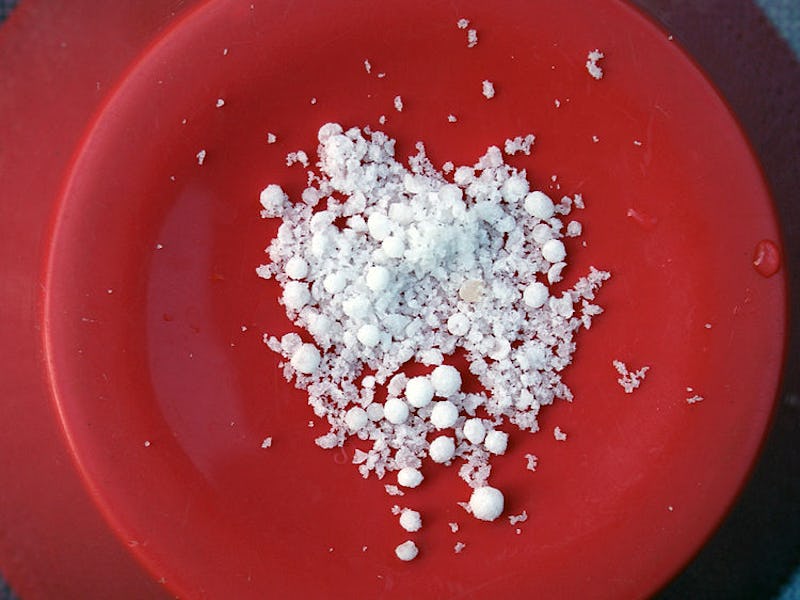Ammonium nitrate: Beirut explosions underscore the need for better regulations
How regulating ammonium nitrate can prevent future explosions.

Blasts in Lebanon's capital have left at least 135 people dead and more than 5,000 injured, overwhelming hospitals during a global pandemic. Lebanon has subsequently declared a state of emergency.
The source of the explosions, which happened on Tuesday, appears to be a chemical called ammonium nitrate.
An estimated 2,750 metric tons of the chemical was stored in a Beirut port warehouse, unsecured for six years, Lebanese Prime Minister Hassan Diab said in a statement. Investigation into the storage of ammonium nitrate, and ignited the shipment, is ongoing. Lebanese officials told Reuters that "negligence" is responsible for the fatal explosions.
Videos posted on Twitter show the devastating explosion, the effects of which were felt from miles away. The footage below was taken from a distance, but may be upsetting to some viewers:
Under high temperatures, it's possible for ammonium nitrate to combust on its own. But the compound may have been ignited by fireworks stored in the same port, AP reports.
Ammonium nitrate has become an important chemical, used in building, mining, and food production across the world. Here is what you should know about the dangerous, widely used compound.
What is ammonium nitrate, and how is it used?
When ammonia reacts with nitric acid, ammonium nitrate is formed. This synthesis doesn't happen in nature and has to be created in a lab.
The resulting water-soluble chemical is produced in tiny pellets, which look similar to road salt. Ammonium nitrate is primarily used in agriculture, as a fertilizer high in nitrogen — one of the essential nutrients for growing crops.
It is also used in industrial-grade explosives, for mining and other construction projects — it makes up a substance called ANFO, or ammonium nitrate/fuel oil. The chemical has also been studied for use in large rocket motors.
How dangerous is ammonium nitrate?
In theory, strict guidelines set by government agencies help to prevent accidents surrounding ammonium nitrate. But when safety measures aren't enforced, the result can be fatal.
In April 2013, an explosion at a fertilizer plant in West, Texas left 15 people dead and 260 injured. Seven years later, the exact root cause is still being investigated. Among the suspected safety lapses were storing materials in wooden structures, keeping combustible materials near the chemical, and lack of emergency planning.
In April 2013, an explosion in West, Texas was caused by the chemical.
Accidental ammonium nitrate explosions also occurred in Toulouse, France in 2001, and Tianjin, China in 2015. The chemical has also been used deliberately in explosives: It was a key ingredient in the 1995 Oklahoma City bombing.
In Beirut, failure to properly store a massive amount of the dangerous chemical is theorized to be behind the fatal explosions.
"It is unacceptable that a shipment of 2,750 tons of ammonium nitrate was stored for six years in a warehouse, and that no preventative measures were taken," said Mahmoud Al-Asmar, secretary-general of Lebanon's higher defense council.
How is ammonium nitrate regulated in the US? — The US uses millions of tons of ammonium nitrate each year, both as fertilizer and in industrial explosives. About 90 percent of explosives in the US are ammonium nitrate-based, according to the United States Geological Survey.
As The Center for Public Integrity reports, it's difficult to determine exactly where ammonium nitrate is stored, for safety reasons.
Ammonium nitrate is regulated by a joint commission of three US agencies:
- The United States Environmental Protection Agency
- The Occupational Safety and Health Administration
- The Bureau of Alcohol, Tobacco, Firearms, and Explosives
Those agencies set guidelines for storing and handling the chemical. But regulations aren't always air-tight. The EPA, for instance, left ammonium nitrate off a list of hazardous substances that deserve special attention, CPI reports. And it does not appear on OSHA's list of "highly hazardous chemicals which present a potential for a catastrophic event at or above the threshold quantity."
The US Cybersecurity and Infrastructure Security Agency have proposed a more targeted program to establish safety measures, called the Ammonium Nitrate Security Program. The idea has been in play for years but is yet to be finalized.
In a piece for The Conversation, chemical engineer Gabriel da Silva makes a case for increased regulations. He points to Beirut as a reminder of why storing ammonium nitrate safely means keeping people safe.
"The explosion in Beirut shows us just how important these regulations are," da Silva writes.